With thousands of short films created every year, the battle for exposure has never been more competitive. One sure way to get your film in front of eager viewers is to tap into a prebuilt audience by having your short screen as part of a festival or on an online platform, but how do you make that happen?
In the first of a recurring series of interviews where we talk to those whose job it is to fund, produce, programme and distribute short films, we talk to Jess Gormley, the Executive Producer of the Oscar, BAFTA & EMMY award-winning Guardian Documentaries, to discover what they look for in a selected short and how they go about finding an audience for the film.
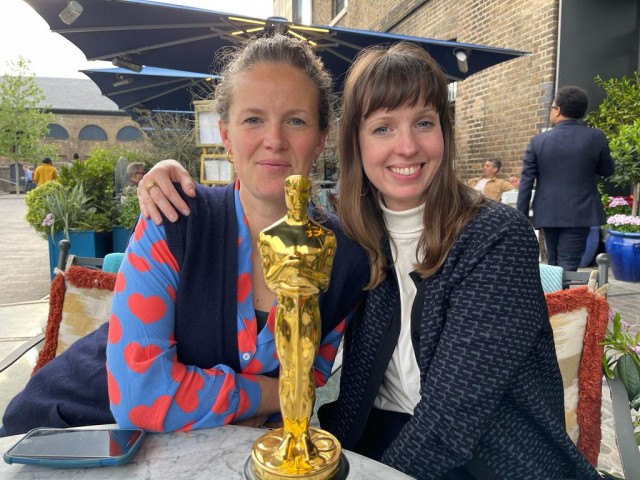
Jess Gormley (EP of Guardian Documentaries) and Lindsay Poulton (Head of Guardian Documentaries) with the 2021 Oscar Award for Colette
Thank you for joining us Jess. For those who are unfamiliar with the work of Guardian Docs, can you introduce the strand and the role you personally play in the process?
Guardian Documentaries is our short form documentary strand. It sits on The Guardian’s global website as well as on the Guardian’s YouTube channel. I work alongside Lindsay Poulton, head of documentaries. We look to commission short form films, roughly 12 – 20 a year, so around 1-2 a month. And when I say short form, we’re looking at films between 15 to 30 minutes long. I’m the executive producer of the strand, so I help commission and curate our slate of films, as well as feed into each stage of production on commissioned projects.
“It’s harder to sell a film to an online audience when it’s over 30-minutes”
What made you decide on that time limit of 15 to 30-minutes? And how strict are you with those restrictions?
We’re not a TV channel, we don’t have specific slots that we’re filling, so we can be quite flexible with timings. But what I would say is that it’s harder to sell a film to an online audience when it’s over 30-minutes.
The Guardian Docs strand is part of Guardian News & Media, a global news organisation that delivers fearless, investigative journalism – giving a voice to the powerless and holding power to account. I was wondering how does the approach of the news group as a whole influence what you do at Guardian Docs?
Guardian Documentaries is an expression of the core editorial ethos and purpose of the Guardian. We are to video what the Long Read is to the newspaper – we go behind the headlines and do a deep dive into certain stories and pressing contemporary themes.
So we look for documentaries about compelling contemporary stories across all of our editorial areas of interest – from environment stories, to migration, human rights, Indigenous storytelling, LGBTQ+ stories, and films that help us understand conflict. That’s not an exhaustive list though, we’re always reflecting the changing world we live in.
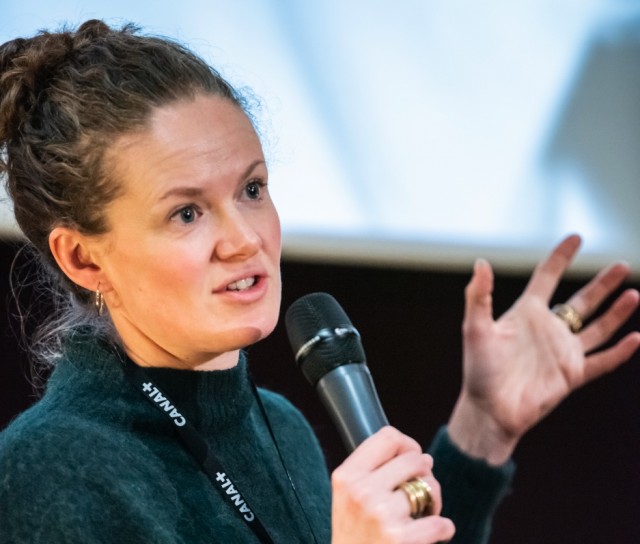
Jess Gormley addressing the audience at the Clermont Ferrand festival.
Great. So you touched on a bit of this in your previous answer, but what makes a Guardian Docs short film? What are the qualities that a short film chosen for your strand should have?
The key thing is access to unique characters that get to the heart of urgent contemporary stories. We’re interested in documentaries with a strong visual approach and creative treatment. So we try to get a balance between films that are relevant and connect with the news, but are also cinematic and innovative in the way that they’re using storytelling devices. We also look for projects that have global relevance and will appeal to our global audience.
We’re as interested in the filmmakers who tell the stories as we are in what those stories are, so we consider the filmmaker’s position in relation to the story, character, or region they’re working in.
A History of Guardian Docs in 10 Short Films
- Gun Nation (2016) – Guardian Documentaries first film
- The Trap (2018) – Stand out online audience
- Black Sheep (2018) – Oscar nominated documentary
- The Circle (2020) – Experimenting with form in relation to urgent contemporary issues
- Colette (2021) – Oscar winning documentary
- Eve (2021) – Tells urgent but hopeful story of the climate emergency
- Get Away from the Target (2021) – Emmy Award winning documentary about Europe’s migrant crisis
- The Black Cop (2022) – BAFTA award winning documentary
- The ‘Spider-man’ of Sudan (2022) – Nominated for a One World Media Award in an area of current conflict
- The Year that Never Ended (2023) – Ukraine year-in-the-making documentary, following the out-break of war
Watch the History of Guardian Documentaries collection on Shortverse
And how’d you go about discovering the projects that will become Guardian Docs?
There are two key areas. We have a pitching form that’s on the Guardian and that’s the best way to approach us. In that form it will ask for the title, logline, synopsis, what your key access is, what your production schedule and budget are, and if you’ve got any financing in place already. We’ll also want to see some sample material, and how you think this project links to Guardian journalism.
“We need proof of access and some sample footage”
We can get involved with projects at a variety of different stages, but the earliest we tend to get on board is late development. So at that stage we need proof of access and some sample footage which we ask you to upload to the pitching form.
And just for full transparency, the way the pitching form process works is that the project comes through to our central database, and then that gets reviewed every two weeks by our team. We try to get back to people within a month but we do get inundated with projects, receiving thousands a year and we only commission around 12 – 20 films from those.
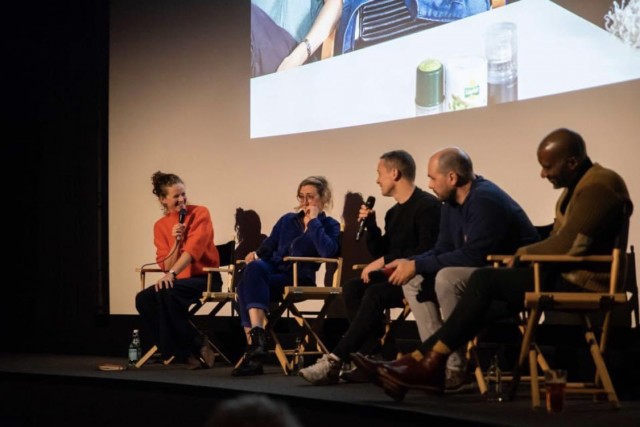
Jess Gormley (L) speaking at the London Short Film Festival
I would always advise that people pitch through that form rather than just emailing us. It’s an open call process, so it’s open throughout the year and you can pitch whenever you want.
Another way that we find projects is through film festivals. We regularly do Meet Markets at various international film festivals, where we try to meet as many filmmakers as possible who will pitch specific projects to us. We also use film festivals as an opportunity to watch films and see which filmmakers we might want to have on our radar.
That all sounds quite familiar. Obviously, Short of the Week comes in at a later stage in the filmmaker’s journey, but we also get thousands of submissions every year, so I can understand how hard just picking 12-20 from that many must be. That’s quite a big pool to select from. Following on from that, once a project is accepted and you start working with the filmmakers, how does that process work?
Once a project is accepted, we would agree terms of The Guardian’s involvement and a rough production schedule before contracting with the filmmakers. We typically review around three cuts and feedback. Then once the film is finished, they’re either launched online immediately or often they can play at film festivals, which we’re happy to support. We work with filmmakers to devise the best launch strategy for their particular film on a case-by-case basis.
When launching on Guardian platforms, we also do trailers on Twitter, Instagram, and YouTube Shorts, and we do a Q&A with the filmmaker in our subscriber newsletter [editors note: which you can sign up to at the bottom of the Guardian Docs page]. Often, we also commission a related article or opinion piece that goes out at the same time as the film, which helps build a storyworld around the film.
Again, you covered some interesting themes that we think about a lot at Short of the Week, in particular, the journey of a film from festival to online. I think in recent years you’ve seen that journey change slightly, as it was always a “festival first” approach. The Guardian Doc’s are always published online, but how do you decide when? And would a potential festival run impact that decision?
It depends if a project is really time sensitive. For example, we did a film that went out on the one year anniversary of all-out war in Ukraine. It was a year in the making and it was important that it hit that symbolic date for its online launch. In that case, the film went out online before it went to film festivals.
“We generally encourage filmmakers to not let their festival period run on too long”
For us, it’s always about thinking about the impact we hope to achieve and getting the right balance, as things can date quickly on a news website. We generally encourage filmmakers to not let their festival period run on too long as they can risk missing the right moment to chime with an online audience.
Trying to get a lot of cross promotion on the Guardian site itself is really helpful. So it’s important not to miss those key dates, but at the same time, for projects that are a little more evergreen they might be afforded a slightly longer festival run. That’s a conversation we have with the filmmakers, and mutually decide what’s best for the life of the film.
Are there times where you’ve brought a release date forward, if that subject becomes more topical?
Definitely. We always ask the filmmakers to be hypervigilant about that as well. We always talk about our projects with our colleagues and Guardian journalists so that we see what crossover there might be to chime in with the film. But likewise, we ask the filmmakers to let us know if there’s any big events that they think could make this project a news story and we stay in constant conversation with them, just before launch, to decide together when we think is best.
Short films from the Guardian Docs strand have seen great success, winning an Oscar and a BAFTA, how do…
And an Emmy.
… And an Emmy, sorry, missed that one
Got the three, the hattrick!
Fantastic. But, internally, in the Guardian Docs team, how do you measure the success of a short film? Again, this is something that’s really interesting to us at Short of the Week. As an online platform, people always think likes, views, comments, those are the things that really matter and they can become somewhat obsessed with them. Of course, reach is important, but we like to think there’s something else outside that, something more and I wondered if this was a conversation you and the team had?
I mentioned that we operate within the editorial purpose of the Guardian, so our first priority is always editorial rigour and creative excellence. That’s how we judge ourselves, first and foremost. Serving the needs of our audience, who we know are curious about the world and want stories they can trust, is really important to us.
Audience numbers and engagement are a part of how we measure impact and it is something that we interrogate, but having said that, engagement is really key. If our audience numbers are a bit lower, but the people that are watching it are engaging with the film and the watch time is high, that is a far better metric for us, as we know people are actively engaging.
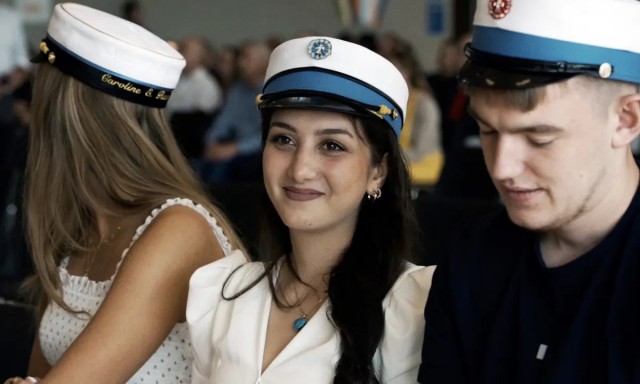
Guardian doc Sending Aya Back played a role in helping to stop a Syrian teenager get deported from Denmark.
As an organization we are interested in holding power to account and having a real world impact. For example, we did a documentary called Sending Aya Back, which was about a Syrian teenager who was trying to fight deportation in Denmark and after the film went out and we did several articles around her case as well, her deportation case was crushed and she was allowed to stay in Denmark. We know it wasn’t solely because of the film, but we’re certain the film helped raise a conversation around her situation. There have been other examples of that too, where putting out one of our documentaries has ignited a debate and got lots of key people involved, who helped to make that real world impact.
“We are constantly trying to reach new audiences in new territories”
There’s different types of impact as well and having meaningful impact within specific communities is also really important to us. So again, serving a particular community well is meaningful impact.
Awards are great and they definitely help with the life of the film, so that is something we do measure success by, but it’s not everything.
Reaching new audiences, that’s really important for us too. We have offices in the US, Australia, and in Europe, but we are constantly trying to reach new audiences in new territories, and also different demographics and age groups.
And does attracting these new audiences come into your thinking when picking the films that will be part of the strand? Is it a driving factor?
Definitely. Across the year we try to get a real diversity of topics, themes and locations and think about the types of audiences that would engage with that project. That’s why it’s really important for us to have that spreadsheet of pitches coming in, because when we are reviewing projects, we are thinking: what have we had previously? What have we got coming up? And how does this project sit within the body of work that we’ve created this year? With each new project we start a completely new debate with new audiences in mind.
You mentioned the films making a “real world impact”, is that something that’s important to you on a personal level? It must feel quite rewarding to know that the work you’re doing is making a difference.
I used to work in feature films, which I loved, but I would spend years on one project only for it to have a limited cinema run with a specific audience and then another wait for a TV release. What I love about this job is that the turnaround is generally faster from point of commission to release and you get an immediate connection with your global online audience, which helps with impact.
For example, we commissioned a film called The Spider-Man of Sudan, which was a hard production, with the team working under difficult circumstances but they were able to turn the production around in months rather than years. And now that Sudan is back in the headlines it feels extremely valuable that we managed to make this project. When so much news coverage has focused on just the military leaders, this documentary offered a global online audience a rare chance to get a street level perspective of the civil society movement. The film has also been seen by policy makers and others that can potentially aid the situation and was even screened in US Congress last month.
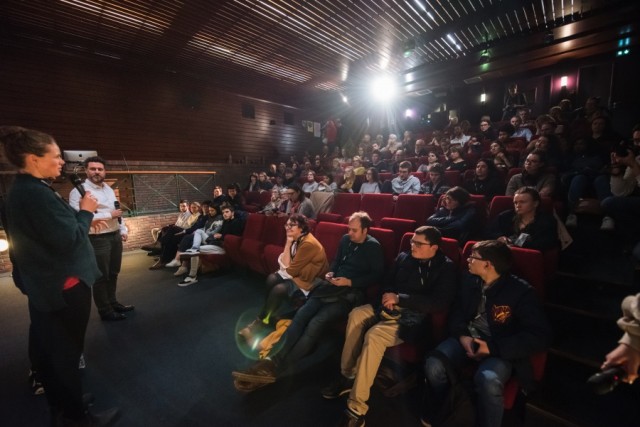
Jess Gormley (L) speaking at the Clermont Ferrand Festival
I couldn’t agree more! Okay, so the final question. As you’re involved in a lot of short film projects and you watch a lot of short films, what’s the one piece of advice you would give to a filmmaker making a short film?
Good question… just one piece of advice
Yeah, I know it’s tough narrowing it down to one?
As an exec producer I always think that when filmmakers are pitching projects they have a strong connection to, or a lived experience of, it really shows and often influences the impact of the film.
“There is a specific art to online filmmaking”
I also think that there is a specific art to online filmmaking. Films can still be cinematic and innovative, but it is slightly different to making a film that’s predominantly for a cinema audience. So I think when pitching to us, at Guardian Documentaries, it’s always good to imagine how people come to our short films and the environment in which they’re watching them. When you are pitching to us, you need to be clear on their relevance, particularly for us as a news organization. So make sure you’re pitching projects that feel urgent, and current, and that will appeal to a global audience.
Yeah again, that’s fascinating to hear because we have films submitted to Short of the Week that have had great festival runs and been picked up for distribution, but when they are submitted you can instantly tell it’s not a good fit for online. Which can, at times, be difficult for the filmmakers to hear and understand.
Anyway, that’s all my questions. Thank you very much, where should our readers go to follow the work of Guardian Docs?
The newsletter is the best way to keep up to date with our work. You can also keep an eye out for us at festivals, we’re going to be at Sheffield DocFest if anybody wants to come and meet me or Lindsay Poulton, Head of Documentaries there. We’re also on Instagram and Twitter.
 Rob Munday
Rob Munday